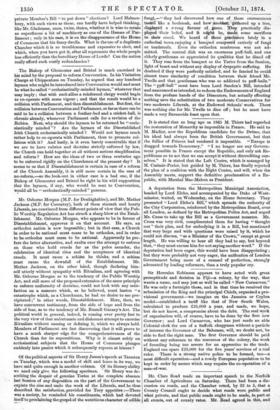The Bishop of Gloucester and Bristol is much exercised in
his mind by the proposal to reform Convocation. In his Visitation -Charge at Chippenham on Tuesday, he argued that any hundred laymen who might be introduced into Convocation would and must be what he called "ecclesiastically-minded laymen," whatever that may imply ; that with such allies a reinforced clergy would begin to co-operate with some rigour; and that the result would be a collision with Parliament, and then disestablishment But first, the collision between Convocation and Parliament, so far as there can be said to be a collision between a feather-bed and a cricket-ball, is chronic already, whenever Parliament calls for a revision of the Rubies. Next, why should the laymen to be returned be "eccle- siastically minded "? Are the laymen of the Disestablished Irish Church ecclesiastically minded ? Would not laymen much rather help to co-operate with Parliament, than to promote col- lisions with it? And lastly, is it even barely conceivable that if we are to have rubrics and doctrine strictly enforced by law, the Church can hold together at all without serious simplification and reform? How are the ideas of two or three centuries ago to be enforced rigidly on the Churchmen of the present day? It seems to us that if Disestablishment is certain in case of a reform of the Church Assembly, it is still more certain in the case of no-reform,--so the look-out in either case is a bad one, if the Bishop of Gloucester and Bristol be right in his wild supposition that the laymen, if any, who would be sent to Convocation, would all be " ecclesiastically-minded " persons.






































 Previous page
Previous page